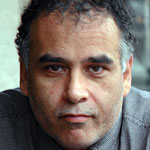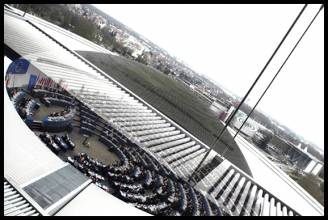
Honestly, one gets the feeling that the European navigation community has finally had enough of talking and is ready to take Galileo out of the hands of politicians and put it into the hands of users, including businesses that can translate European GNSS into real products and services to be bought and sold.
The feeling has certainly been growing within the European navigation community, as evidenced by the conversations at the recent European Navigation Conference (ENC) in Vienna.
Honestly, one gets the feeling that the European navigation community has finally had enough of talking and is ready to take Galileo out of the hands of politicians and put it into the hands of users, including businesses that can translate European GNSS into real products and services to be bought and sold.
The feeling has certainly been growing within the European navigation community, as evidenced by the conversations at the recent European Navigation Conference (ENC) in Vienna.
There were a lot of people and there was a lot of energy at the event, which brings together the industrial, technical, and political core of European Navigation.
Eyebrows were raised at the opening keynotes session when David Blanchard, deputy head of the European Commission (EC) Satellite Navigation Program Management Unit, used the word “team” in reference to the EC, European GNSS Agency (GSA), and European Space Agency (ESA) triumvirate.
No, “team” is not a bad word, or even a very remarkable word, not even in Europe. It’s just that people have gotten so used to the idea that those three units would never find a way to get along.
“It didn’t sound like a platitude to me,” said one audience member. “It sounded like he meant it.”
For his part, the GSA’s always-cordial Carlo des Dorides, certainly someone you’d want on your team, set the tone for the entire conference by referring to “user benefits” and “service provision” as the real issues now on the table.
Can We move Forward, Please?
Throughout the three-day conference, one sensed a readiness on all parts to put the old dread of imminent failure behind and move swiftly into profitmaking mode.
Galileo is here. Well, almost. And the question is no longer “if” or even “when?” The question is, “what are we going to do with it?” Or, better yet, “what can we do with it right now, right this minute?”
Werner Enderle, head of ESA’s Navigation Support Office, pointed out that Galileo, today, with just four operational satellites in orbit, already produces a measurable and significant effect on GNSS precision, when GNSS signals are combined (GPS, GLONASS, and Galileo).
Pinpoint precision aside, imminent operations, for the politicians, means all sorts of wonderful things for citizens and society. For the entrepreneurial- minded, it means cold hard cash. ‘Let’s make some money off of it!’
Walter Aigner of HiTec Marketing, Vienna, has a straightforward analysis of the situation: “We’re all going to die; so, let’s try to get something out of GPS now.”
Aigner’s LinkedIn profile says he “facilitates hands-on innovativeness with leading-edge Champions in Europe.” He certainly champions his own town of Vienna, which, he reminds everyone, has been named “the world’s most livable city” four times in a row.
Aigner seems to argue, though, against a too-utopian vision of the modern mobile city: “There are car drivers who are responsible people, who want to reduce their environmental footprint but who are never going to stop driving.
“But for a lot of the ‘mobility people’, the car driver, any car driver, is simply the bad guy,” he adds. “We’re building bike paths and pedestrian zones and intelligent public transport systems. We only need car drivers so we can charge them, punish them, use them to generate revenue.”
Yet even these evil car drivers are still consumers, he reasons. “We should be focusing on user groups like responsible car drivers who we can target with new GNSS services right now, in the short term.
“What about a new service pack for responsible car drivers, suggesting better driving routes, helping them to modulate speed, braking, and accelerating?” Just an idea, he says, but an idea that could work right now for a resourceful and short-to-medium- term–minded team of entrepreneurs.
Take the Money and Run
The capability to stimulate new business has long been a key measuring stick of the success of Galileo. The system’s promoters have always cited strengthening of the European GNSS industry as a core program driver.
What many are coming to realize, however, is that this is going to be just as much a test of European entrepreneurship as it is of technical and political ingenuity.
Out here in the jungle, profits don’t come for free (unlike the free Galileo Open Service). It takes money to make money. It takes investment. And for many up-and-coming European businesses, that’s the real impediment to forward progress. If they want to stay European, that is.
Consider Aloqa. Founded as a start-up/spin-off by graduates of Ludwig Maximilians University of Munich, this innovative, small venture developed a platform for mobile location services in Germany, basically notifying users about interesting places, events, music, movies, and other activities near to their current location.
Aloqa received a modest amount of seed funding from private European investor and local hero Wellington Partners. According to insiders, this investment was based purely on personal connections, as one of the Aloqa team members had previously been a trainee with Wellington.
So far, so good, but the punch line is that within another two years Aloqa got swallowed up by Motorola and all its exciting and innovative brains moved to the United States. Subsequently, Motorola then got swallowed by Google, which only made everyone that much more comfortable.
Happy ending?
Certainly, for the team’s founders, who, as rumor has it, are now living in high style and looking for new start-ups to invest in themselves. In California. They could not be reached for comment.
Strangely, some of the work being done in Europe, purportedly to help build European competitiveness in the GNSS market, seems to be doing exactly the opposite. Take, for example, the German Government’s “Accelerator Program,” which runs a contest for high-tech start-ups and then finances a stint for the winners in Silicon Valley.
Although the objective is to access the U.S. market, some have strong doubts that this solves the funding gap or creates jobs in Europe. Another industry insider, who prefers not be named for fear of appearing to criticize the German Ministry of Economy, explains the apparent misdirected investment: “They are using taxpayer money to actively export entrepreneurial ICT [information and communications technology] talent, which was carefully groomed in taxpayer-funded European universities.”
When and Where to Invest
Of course, Germany and Europe as a whole are doing or at least trying to do some good, with many public seed funds actively promoting local entrepreneurship.
Gard Ueland, chairman of Galileo Services, an association devoted to encouraging industry to take advantage of a growing GNSS market, explains the reasoning: “There are many successful European GNSS companies already in place and expanding. However, for European industry as such to take a significantly larger share of the GNSS market, we feel that public incentives and funding are required.”
“Such measures will attract start-ups and established companies alike to broaden their scope and enter new market niches — initiatives that might not have taken off without such incentives.”
But many of those involved are beginning to realize that public funding is what it is, and ain’t what it ain’t.
This includes Ueland himself.
“Public funding for developing new products has never been intended as capital for this [the marketing] phase. In a start up’s early life,” he says, “capital is often a limited resource. Industrializing new products and introducing them on the market is a capital-intensive and time-consuming process.
Further, if this is conducted within a start-up, the challenges are massive and the need for fresh capital in the process is the rule rather than the exception.” The European Commission also seems to have had a similar “Aha!”. One EU-funded initiative, for example, called Mobicap, is aimed specifically at helping to get start-ups off public funding and onto private funding.
As Rainer Horn of Mobicap coordinator SpaceTec Capital points out, Europe is lagging very far behind the United States in terms of genuine venture capital. “Public funding only gets you so far,” he says.
Indeed, the recurrent problem is that research-based companies, particularly in Europe, tend to become dependent on research grants. It’s kind of like a drug addiction. They go from one grant to another, always just keeping their heads above water, never setting their sights on anything higher, never truly getting off the ground.
Mobicap is trying to get grant-addicted small companies back into the real world, kind of like methadone treatment.
“We need to take these engineers and make them into entrepreneurs,” says Horn. “It is not the same skill set.”
Once on private funding, he says, only one out of two young companies will survive. “But that’s the capitalistic system; even with a high failure rate, the return in terms of eventual profits will have been worth the trouble.”
Horn says, and many European will agree, that Silicon Valley doesn’t have to be everyone’s Holy Grail. “We want to support and build up and make companies strong right here in Europe.”
The sad reality though is that Aloqa is only one of many examples of innovative start-ups being drawn to the US by much more readily available venture capital. For ambitious European companies, the investors just aren’t ‘here’. They’re ‘over there’. And foreign investors find it easier to do business in their own comfortable environments. That means pulling bright young innovators out of Europe and onto safer ground back home.
In a separate interview with Inside GNSS, no less a personage than European Commission Vice-President Antonio Tajani chimed in on the subject. “One should not disregard the fact that the entrepreneurial culture in the U.S., where both investors and entrepreneurs are quite comfortable with ventures not necessarily turning out as success stories, is different than in Europe.”
As Aigner suggests, one problem may be Europe’s deeply ingrained reputation as a ponderous, perplexing, and generally inhospitable business environment: “Investors look at the situation and they say, ‘Yes, the US is doing things the right way. Asia, yes, it’s very clear how business works in Asia. Europe? How do things work in Europe? We don’t understand Europe. Let’s leave Europe out of the equation’.”
Who Will Answer the Call?
Any way you slice it, a hard road still lies ahead for European GNSS. As Galileo comes to fruition as a functioning infrastructure, European entrepreneurs are being called upon to step up to the plate.
The EC, ESA, and the GSA can and should be congratulated for the job they’ve done in building a world-class satellite navigation system. Little doubt remains that Galileo and EGNOS will ultimately succeed in delivering real services.
The question is whether the European capitalist community has the guts to put up or shut up. If Galileo fails to deliver on its promise of new businesses, jobs and growth, it won’t be the fault of the politicians. The new infrastructure is here, money can be made now. Someone needs to reach out and grab it.





